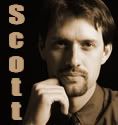Interpreting Genesis
When one knows the lay of the land, they can better understand what the poet is describing. Psalm 19 is better understood now that we know the world is not flat and that the sun does not orbit the earth. We can interpret it better because we can be certain the the inspiration of the Spirit is not intending the narrative to be a scientific description of cosmology.
What is most interresting for me to think about these days is reading Genesis 1-2 with the assumption that Darwin was right.Now of course there were some elements of his theories that have since been disproven. Much the same way that Copernicus was right that the sun, not the earth, was the center of the solar system. Yet he was wrong that the sun was the center of the universe. Yet, the basic premis of a old earth with evolved lifeforms has now been all but canonized by the scientific communittee.
We have no problem interpreting the stelar references in Psalm 19 as Anthropromorphic. That is easy because outside the exogetical arena we use the tera-centric language to reference a helio-centric reality. For example we will use terms like sunrise, sunset, and shooting star, to describe the turning of the earth and collisions with astroids. The language naturally guides the interpretation. However, we do not use creation language to references evolutionary realities. insteaad of "creature," we say "animal." Instead of "forming" we say "evolving." As a result, we cannot interpret Genesis with evolution in the picture.
Read it again for the first time with the assumption that man evolved from a lower version of primates. What is the narrative of Adam and Eve telling us?
If I eroneously assumed the genre to be scientific or historical, what have I been missing in my interpretations.
Augustine gave us the notion that the "Fall" was a crash away from perfection. A predictable theology coming from a neo-platonist. Evolution suggests something entirely different. That homo-sapiens are being formed into the image of God through a process. We evolved physically to the point where we could realize God's existence, and navigate with a morality that is absent in all other lifeforms. Then there was an awakening to the condition of original sin. This sin/nakedness was always there, but our ignorance made us inocent. Adams first sin was not the tree, but his nakedness. Yet the tree was his first disobedience. It is the first moment where God's will is known and disobeyed. Is the tree, and the event of the fall alegorically referencing the aquisition of morality and the subsequent disobedience of the human race?
It would be hipocritical to stick our fingers in our ears saying "Na Naa Naaa" just because these scientist cannot read the original Hebrew. Was it a fall down or a fall forward? Is redemption a neccesary part of our progression into the image of God?
In most other contexts, this might rise the ire of the theologically minded. But I nolonger have the luxury of ignorance. I know the process of creation took millions of years, and we were part of that process. I know that we were made in the image of God and that Christ was incarnated into human form and then redeemed us through his death and resurection. In the light of new and very convincing evidence, I must reinterpret what I see and what I read.
What is most interresting for me to think about these days is reading Genesis 1-2 with the assumption that Darwin was right.Now of course there were some elements of his theories that have since been disproven. Much the same way that Copernicus was right that the sun, not the earth, was the center of the solar system. Yet he was wrong that the sun was the center of the universe. Yet, the basic premis of a old earth with evolved lifeforms has now been all but canonized by the scientific communittee.
We have no problem interpreting the stelar references in Psalm 19 as Anthropromorphic. That is easy because outside the exogetical arena we use the tera-centric language to reference a helio-centric reality. For example we will use terms like sunrise, sunset, and shooting star, to describe the turning of the earth and collisions with astroids. The language naturally guides the interpretation. However, we do not use creation language to references evolutionary realities. insteaad of "creature," we say "animal." Instead of "forming" we say "evolving." As a result, we cannot interpret Genesis with evolution in the picture.
Read it again for the first time with the assumption that man evolved from a lower version of primates. What is the narrative of Adam and Eve telling us?
If I eroneously assumed the genre to be scientific or historical, what have I been missing in my interpretations.
Augustine gave us the notion that the "Fall" was a crash away from perfection. A predictable theology coming from a neo-platonist. Evolution suggests something entirely different. That homo-sapiens are being formed into the image of God through a process. We evolved physically to the point where we could realize God's existence, and navigate with a morality that is absent in all other lifeforms. Then there was an awakening to the condition of original sin. This sin/nakedness was always there, but our ignorance made us inocent. Adams first sin was not the tree, but his nakedness. Yet the tree was his first disobedience. It is the first moment where God's will is known and disobeyed. Is the tree, and the event of the fall alegorically referencing the aquisition of morality and the subsequent disobedience of the human race?
It would be hipocritical to stick our fingers in our ears saying "Na Naa Naaa" just because these scientist cannot read the original Hebrew. Was it a fall down or a fall forward? Is redemption a neccesary part of our progression into the image of God?
In most other contexts, this might rise the ire of the theologically minded. But I nolonger have the luxury of ignorance. I know the process of creation took millions of years, and we were part of that process. I know that we were made in the image of God and that Christ was incarnated into human form and then redeemed us through his death and resurection. In the light of new and very convincing evidence, I must reinterpret what I see and what I read.




I will agree with you Scott, though I must mention that I think the similarties and differences between the Egyptian Creation Narrative and Genesis 1 and 2 (which are very similar) would perhaps teach us more about God, his relationship with us, and us as his image-bearers, rather than wearing evolutionary lenses to look at it.
However, I must say that wearing those lenses is also a valid thing to do.
Posted by Anonymous |
10:07 PM
Anonymous |
10:07 PM
I always appreciate what you have to say and what you are stewing about. I already miss being in the same local as you and catching glimpses!
Take care and hope to see you soon!
Posted by Unknown |
10:50 PM
Unknown |
10:50 PM